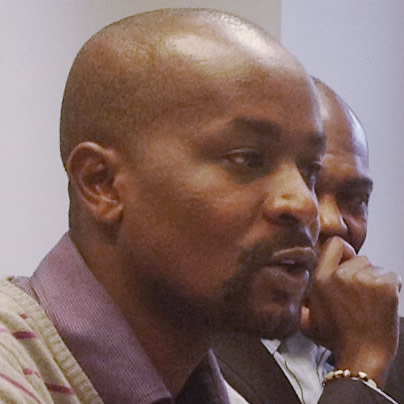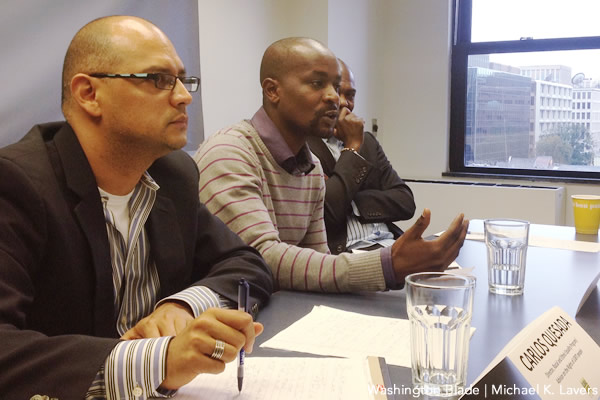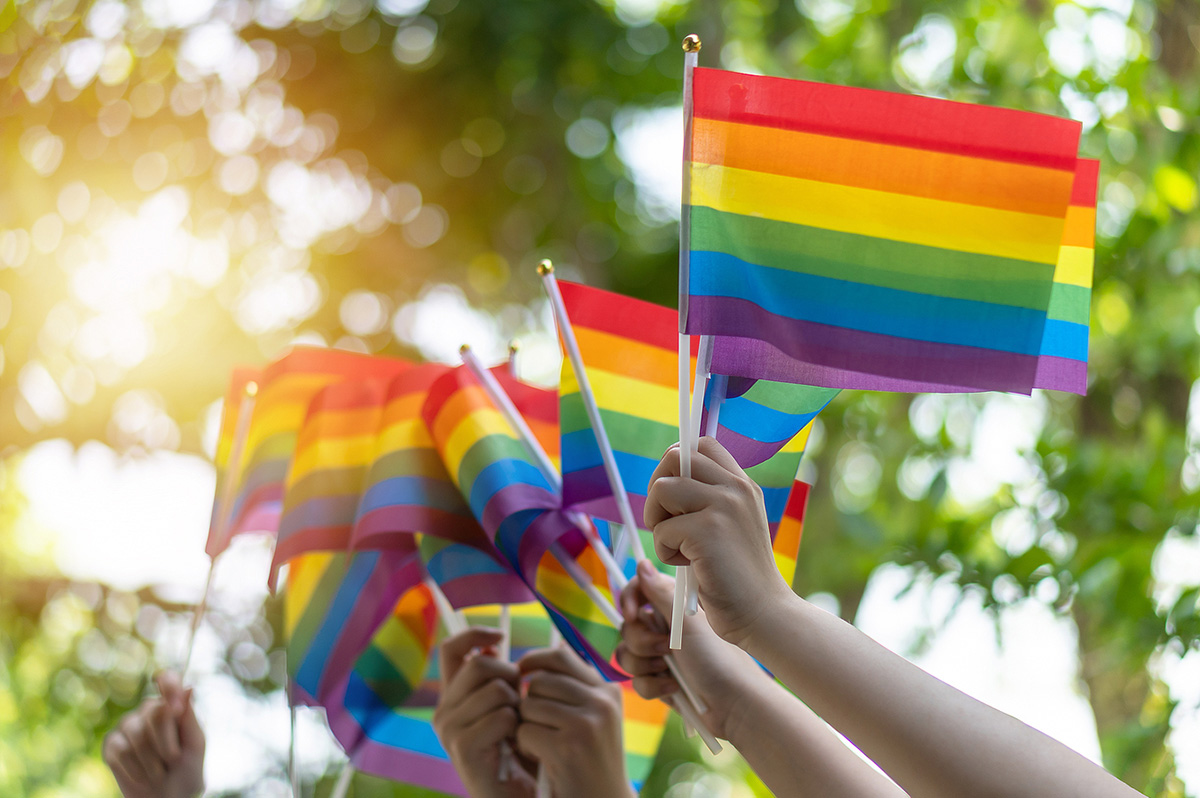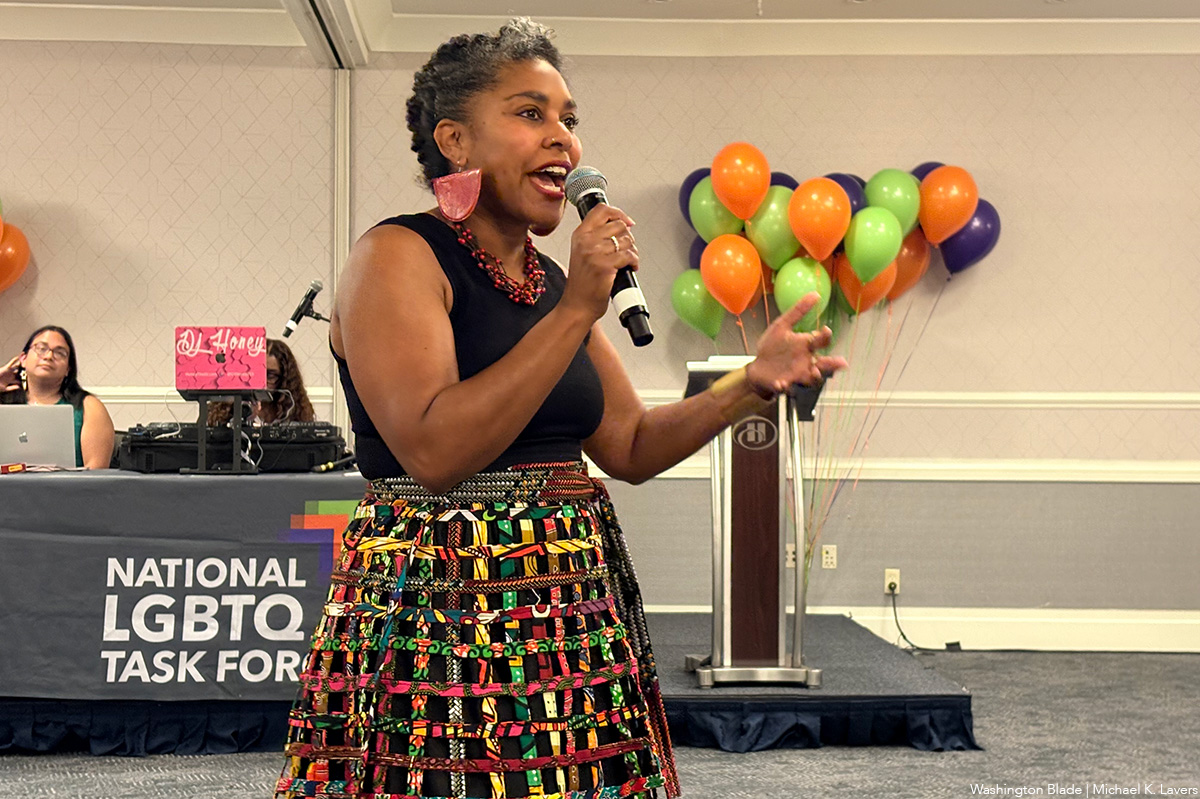News
Kenyan LGBT rights activist visits D.C.
Anti-LGBT violence remains pervasive in African nation


Eric Gitari of the National Gay and Lesbian Human Rights Commission of Kenya, center, speaks at Global Rights in D.C. on Oct. 11, 2013. (Washington Blade photo by Michael K. Lavers)
A leading Kenyan LGBT rights activist told the Washington Blade during a recent interview he feels his fellow advocates can learn a lot from their U.S. counterparts.
“They own their agenda and they drive it,” said Eric Gitari, executive director of the National Gay and Lesbian Human Rights Commission of Kenya. “I want to draw lessons on how we can get more people to own this equality agenda.”
Gitari spoke with the Blade after he appeared on a panel with Pastor Joseph Tolton of the Fellowship of Affirming Ministries at Global Rights in Northwest D.C. on Oct. 11. The activist also visited the Human Rights Campaign and Human Rights Watch and spoke at the Howard University School of Law and Columbia University in New York before he left the U.S.
Kenya’s colonial government in 1897 adopted India’s penal code that included the criminalization of same-sex sexual relations.
Those convicted under the law could face up to 14 years in prison, but Gitari noted there has never been what he described as “a successful prosecution” under it. He said during the panel that a coalition of groups that hope to repeal the pre-independence statute hope to implement a strategy similar to that used by those who challenged India’s sodomy law – judges on the Delhi High Court in 2009 found the country’s colonial-era statute unconstitutional.
“They are using parallels from the New Delhi case in India to engage their strategies,” Gitari said.
Gitari also noted homophobia, transphobia and anti-LGBT discrimination and violence remain pervasive in Kenya in spite of a new constitution the country adopted in 2010 that acknowledges human rights, equality and other universal values.
He said “ex-gay” programs remain common in Kenyan schools, and students as early as fifth grade are taught homosexuality is a “social deviance” that is comparable to drug activity and criminality. Gitari further noted a 2012 secondary education certification exam asked high school students to give 10 reasons why Kenyan Christians are “united against homosexuals.”
“This law is informing a lot of public policy positions and attitudes,” he said.
A mob in Mtwapa near the coastal city of Mombasa in 2010 doused four gay men whom they thought were about to attend a same-sex wedding with kerosene.
“This was instigated by religious leaders; religious leaders to the present walk scot free,” Gitari said. “[They] have never, ever been investigated in spite of efforts to push for such an investigation for such hate crimes.”
Kenya is among the 76 countries in which consensual same-sex sexual relations remain illegal. Sudan, Mauritania and a handful of other nations continue to impose the death penalty upon anyone found guilty of homosexuality.
Lawmakers in Uganda, which borders Kenya, have faced widespread criticism over a bill Parliamentarian David Bahati introduced in 2009 that sought to execute those convicted of repeated same-sex sexual acts.
President Obama in June spoke out against the criminalization of homosexuality during a press conference in Senegal, which is among the 38 African countries in which consensual same-sex sexual activity remains illegal.
Gitari noted the majority of Kenyans respect Obama because the president’s father was born in the country, but they criticized him over the comments he made while in Senegal.
“There were attempts by people, by propaganda machines within the conservatives to rob him of his African identity,” Gitari said. “They see Obama as a player in the spreading of that Western agenda of homosexuality.”
Advocates look to courts to expand LGBT rights
Gitari and his group hope to use the courts to gain legal protections for LGBT Kenyans that include the eventual repeal of the country’s sodomy law.
A three-judge panel on the High Court of Kenya in 2010 refused to legally recognize Richard Muasya, an intersex person who suffered abuse inside a maximum security prison. Muasya received 500,000 Kenyan shillings (or nearly $5,900) for the mistreatment inside the facility, but the judges said they found no evidence of anti-LGBT discrimination and human rights violations in the country.
The Kenyan Human Rights Commission in 2011 published a report that documented anti-LGBT discrimination. The Kenyan National Commission on Human Rights the following year released a second report that found widespread anti-LGBT discrimination in the country’s health care system.
The High Court of Kenya in June ruled in favor of a transgender woman who claimed police officers in a town outside of Nairobi, the country’s capital, stripped her naked in front of local reporters to determine her gender after they arrested her for assault in 2011. She also accused the officers of groping her breasts during the incident.
Gitari’s group also continues to seek formal recognition in the country.
“Our roadmap is informed by incremental litigation,” Gitari said.
Gitari traveled to D.C. less than a month after members of the Somali terrorist organization al-Shabab killed more than 60 people at a shopping mall in the Kenyan capital of Nairobi.
The East Africa Center for Law and Justice, which the American Center for Law and Justice that anti-gay televangelist Pat Robertson founded in 1990, is among the groups that continue to pose significant barriers to LGBT-specific advances in Kenya. In spite of this resistance, Gitari told the Blade he has not seen any homophobic rhetoric as a result of last month’s attack.
“The good thing that has emerged from it is that Kenyans are beginning to see that teaching extremism and using religion to justify hatred is no longer the way,” Gitari said. “It’s costing innocent lives and it’s not rational in a civilized world anymore.”
World
Companies participate in ‘Pride on the Promenade’ at World Economic Forum
GLAAD co-organized initiative

A dozen companies that are participating in the World Economic Forum on Wednesday lit up their venues on the Davos promenade in rainbow colors.
Amazon, Axios, Bloomberg, Circle, Cisco, Cloudflare, Edelman Trust House, Hub Culture, Salesforce, SAP, Snowflake, and Workday participated in the “Pride on the Promenade” that GLAAD, Open for Business, and the Partnership for Global LGBTIQ+ Equality organized. It is the fourth year the organizations have organized the initiative during the World Economic Forum.
The annual event is taking place this week in the Swiss ski resort town of Davos.
GLAAD CEO Sarah Kate Ellis on Wednesday moderated a panel in which Open for Business CEO Ken Janssens and Iris Bohnet, co-director of the Harvard Kennedy School’s Women and Public Policy Program, among others, participated. President Donald Trump earlier in the day spoke at the World Economic Forum.
“World leaders, corporate executives, and global media are discussing new ways to evolve inclusion and social issues, but leaders in those institutions and our community as a whole need to do more to support LGBTQ people globally,” said Ellis in a statement that GLAAD sent to the Washington Blade on Thursday. “At a time when decades-old alliances are being challenged, the importance of this visible show of solidarity at the largest convening of global decision makers cannot be understated. Inclusion remains a necessary business practice and companies that demonstrate shared values of family and freedom know this helps grow the bottom line.”
Virginia
LGBTQ rights at forefront of 2026 legislative session in Va.
Repeal of state’s marriage amendment a top priority

With 2026 ramping up, LGBTQ rights are at the forefront of Virginia politics.
The repeal of Virginia’s constitutional amendment that defines marriage as between a man and a woman is a top legislative priority for activists and advocacy groups.
The Virginia Senate on Jan. 17 by a 26-13 vote margin approved outgoing state Sen. Adam Ebbin (D-Alexandria)’s resolution that would repeal the Marshall-Newman Amendment. The Virginia House of Delegates earlier this month passed it.
Two successive legislatures must approve the resolution before it can go to the ballot.
The resolution passed in 2025. Voters are expected to consider repealing the amendment on Nov. 3.
The Virginia General Assembly opened with an introduction of a two-year budget — Virginia’s budget runs biannually.
In 2024 some funding was allocated to LGBTQ causes, and others were passed over. This year’s proposed budget leaves room for funding for a host of LGBTQ opportunities. One specific priority that Equality Virginia is promoting would ensure the state budget expands healthcare for LGBTQ individuals and extending gender affirming care.
Equality Virginia Communications Director Reed Williams told the Washington Blade the organization is also focused on passing three main budget amendments, and ensuring “LGBTQ+ students and their teachers have resources to navigate and address mental health challenges in K-12 schools.”
Along with ensuring school training, the organization wants funding in hopes of “establishing enhanced competency training for Virginia’s 988 Lifeline counselors and support staff to provide affirming care for LGBTQ+ youth.” This comes after the Trump-Vance administration shut down the specific hotline for LGBTQ young people that callers could previously reach if they called 988.
On a federal level, protections and health care access for LGBTQ people has taken a hit, as the Trump-Vance administration has continued to issue executive orders affecting the health care system. LGBTQ people no longer have federal legal health care protections, so local and state politics has become even more important for LGBTQ rights groups.
Equality Virginia has urged its supporters to call their local senators and stress the importance of voting to expand health care protections for LGBTQ people. The organization also plans to hold information sessions and a lobby day on Feb. 2.
Equality Virginia is tracking bills on its website.
District of Columbia
Faith programming remains key part of Creating Change Conference
‘Faith work is not an easy pill to swallow in LGBTQ spaces’

The National LGBTQ Task Force kicked off the 38th annual Creating Change conference in D.C. this week. This year, as with years past, faith and interfaith programming remains a key part of the conference’s mission and practice.
For some, the presence of faith work at an LGBTQ+ conference may seem antithetical, and Creating Change does not deny the history of harm caused by religious institutions. “We have to be clear that faith work is not an easy pill to swallow in LGBTQ spaces, and they’re no qualms about saying that we acknowledge the pain, trauma, and violence that’s been purported in the name of religion,” Tahil Sharma, Faith Work Director for the National LGBTQ Task Force, said.
In fact, several panels at the conference openly discuss acknowledging, healing from, and resisting religious harm as well as religious nationalism, including one scheduled today titled “Defending Democracy Through Religious Activism: A panel of experts on effective strategies for faith and multi-faith organizing” that features local queer faith activists like Ebony C. Peace, Rob Keithan, and Eric Eldritch who are also involved in the annual DC Pride Interfaith Service.
Another session will hold space for survivors of religious violence, creating “a drop-in space for loving on each other in healing ways, held by Rev. Alba Onofrio and Teo Drake.”
But Sharma and others who organized the Creating Change Conference explained that “a state of antipathy” towards religious communities, especially those that align with queer liberation and solidarity, is counterproductive and denies the rich history of queer religious activism. “It’s time for us to make a call for an approach to LGBTQ+ liberation that uses interfaith literacy as a tool rather than as a weapon against us,” Sharma explained.
Recognizing a local queer faith icon
Along with the panels, fighting religious nationalism and fostering communion with aligned faith activists and communities is at heart of this year’s faith work. As Sharma shared, “the person that we’re honoring this year for the faith award is Rev. Dr. Sofía Betancourt, and Dr. Betancourt is an amazing leader and someone who really stands out in representing UUs but also representing herself unapologetically.”
Based in the Washington, D.C. area, Dr. Betancourt has more than 20 years of experience working as a public minister, seminary professor, scholar, and environment ethicist, and public theologian. Her activism is rooted in her lived identities as a queer, multiracial, AfroLatine first-generation daughter of immigrants from Chile and Panama, and has been a critical voice in advancing the United Universalism towards anti-racist and pluralistic faith work.
Creating a faith-based gathering space
Sharma also said that faith fosters a unique space and practice to encounter grief and joy. For this reason, Sharma wants to “create a space for folks to engage in curiosity, to engage in spiritual fulfillment and grounding but also I think with the times that we’re in to lean into some space to mourn, some space to find hope.” The Many Paths Gathering Space serves this purpose, where visitors can stop for spiritual practice, speak with a Spiritual Care Team member, or just take a sensory break from the bustle of the conference.
This also means uplifting and foregrounding queer religious ephemera with an ofrenda to honor those who have passed, a display of nonbinary Korean American photographer Salgu Wissmath’s exhibition Divine Identity, and the Shower of Stoles, a collection of about 1,500 liturgical stoles and other sacred regalia representing the lives of lesbian, gay, bisexual, and transgender people of faith.
The Shower of Stoles
The collection was first started in 1995 by Martha Juillerat and Tammy Lindahl who received eighty stoles that accompanied them and lent them solace as they set aside their ordinations from the Presbyterian Church. The whole collection was first displayed at the 1996 General Assembly of the Presbyterian Church in New Mexico. The stoles, according to the Task Force, “quickly became a powerful symbol of the huge loss to the church of gifted leadership.”
Each stole represents the story of a queer person who is active in the life and leadership of their faith community, often sent in by the people themselves but sometimes by a loved one in their honor. About one third of all the stoles are donated anonymously, and over three-quarters of the stoles donated by clergy and full-time church professionals are contributed anonymously.
The collection shows “not just the deep harm that has been caused that does not allow people to meet their vocation when they’re faith leaders, but it also speaks to how there have been queer and trans people in our [faith] communities since the beginning of our traditions, and they continue to serve in forms of leadership,” Sharma explained.
Explicit interfaith work
Along with creating a sacred space for attendees, hosting workshops focused on faith-based action, and recognizing DC’s rich queer religious history, Creating Change is also hosting explicitly faith services, like a Buddhist Meditation, Catholic Mass, Shabbat service, Jummah Prayer Service, and an ecumenical Christian service on Sunday. Creating Change is also welcoming events at the heart of queer religious affirmation, including a Name/Gender/Pronoun/Identity Blessing Ritual and a reading and discussion around queer bibles stories with Rev. Sex (aka Rev. Alba Onofrio).
But along with specific faith-based programs, Sharma explained, “we’re looking to build on something that I helped to introduce, which was the separation of the interfaith ceremony that’s happening this year which is a vigil versus the ecumenical Christian service which is now the only thing that takes place on Sunday morning.”
This includes an Interfaith Empowerment Service this evening and an Interfaith Institute tomorrow, along with “Sing In the Revolution,” an event where folks are invited “to actually engage in the joy and rhythm of resolution and what that looks like,” Sharma said. One of the key activators behind this work is Rev. Eric Eldritch, an ordained Pagan clergy person with Circle Sanctuary and a member of the Pride Interfaith Service planning committee.
Affirming that queer faith work is part of liberation
The goal for this year, Sharma noted, alongside holding space and discussions about faith-based practice and liberation and intentional interfaith work–is to move from thinking about why faith matters in queer liberation spaces to “how is interfaith work the tool for how we’re engaging in our understanding of de-escalation work, digital strategies, navigating a deeper visioning that we need for a better world that requires us to think that we’re not alone in the struggle for mutual abundance and liberation,” Sharma explained.
It may surprise people to learn that faith work has intentionally been part of the National LGBTQ+ Task Force since its beginning in the 1980s. “We can really credit that to some of the former leadership like Urvashi Vaid who actually had a sense of understanding of what role faith plays in the work of liberation and justice,” Sharma said.
“For being someone who wasn’t necessarily religious, she certainly did have a clear understanding of the relationship between those folks who are allies, those folks who stand against us, and then those folks who sit in between–those folks who profess to be of religious and spiritual background and also are unapologetically LGBTQ+,” he continued.
This year’s faith programming builds on this rich history, thinking about “a way to kind of open doors, to not just invite people in but our people to go out into the general scene of the conference” to share how faith-based work is a tool, rather than a hindrance, to queer liberation work.



















